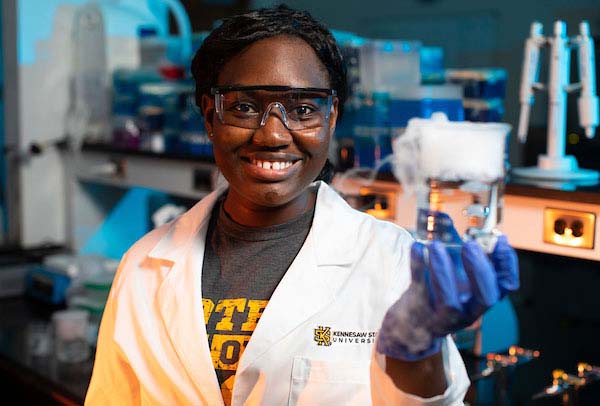

KENNESAW, Ga. | Jun 16, 2021
Diagnosed with hypertension at a young age, Ami Eho sought to educate herself about cardiometabolic health issues that afflicted her and her family.

Eho is working in the exercise science laboratory of associate professor Katherine Ingram through the NIH’s National Institute of Diabetes and Digestive and Kidney (NIDDK) diseases Short-Term Research Experience for Underrepresented Persons (STEP-UP) program, which offers summer research opportunities with a stipend. She is studying the effects of exercise and dietary changes on the hereditary nature of cardiometabolic conditions.
“This is a great opportunity to be involved in research full time during the summer,” the KSU senior said. “On top of the stipend that the NIDDK STEP-UP program offers, the most valuable part of the program is the mentorship that will be accessible to me, and the new knowledge that I will acquire from my mentors through this research experience.”
In December 2013, Eho and her family emigrated from the African nation of Togo. She graduated from Marietta High School, then earned an associate degree in interdisciplinary studies from Chattahoochee Technical College. She transferred to KSU for its biochemistry major, its emphasis on undergraduate research and its proximity to her home in Dallas.
In fall 2020, Eho joined Ingram’s lab, which focuses on the impact of gestational obesity and inactivity on maternal metabolic health. Through her research so far, Eho learned that these conditions often are passed down from generation to generation within families, and that people can manage their conditions with improved diet and regular exercise.
“That is how my interest in exercise science started, because I wanted to know more about treatments that can help prevent hypertension, especially in young people,” she said.
Eho credited Ingram with encouraging her to seek out opportunities for enrichment, such as the NIDDK STEP-UP program. Ingram has personal experience with NIDDK, having served a post-doctoral fellowship at Alabama-Birmingham, and said she was happy to steer Eho toward the STEP-UP program.
“It brings me great joy to see Ami flourish in this research environment,” Ingram said. “She has presented her work at several conferences and is currently working on two papers that will be submitted for publication later this year. This NIDDK STEP-UP experience has given Ami an additional boost to her confidence level and to her career pursuits.”
Eho expects to graduate in spring 2022, after which she plans to attend medical school while pursuing a Ph.D. in biochemistry. She hopes to have a career as a pediatrician and researcher, helping young people with cardiometabolic conditions take charge of their health.
– Dave Shelles
A leader in innovative teaching and learning, Kennesaw State University offers undergraduate, graduate, and doctoral degrees to its more than 51,000 students. Kennesaw State is a member of the University System of Georgia with 11 academic colleges. The university's vibrant campus culture, diverse population, strong global ties, and entrepreneurial spirit draw students from throughout the country and the world. Kennesaw State is a Carnegie-designated doctoral research institution (R2), placing it among an elite group of only 8 percent of U.S. colleges and universities with an R1 or R2 status. For more information, visit kennesaw.edu.